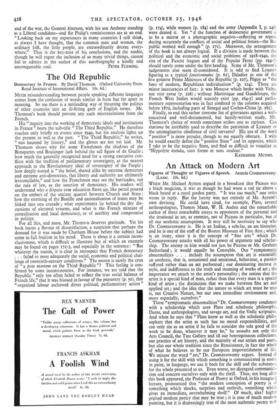The Old Republic
Mucu misunderstanding between people speaking different languages comes from the confusion of words similar in form but far apart in meaning. So too there is a misleading way of thrusting the politics of other countries into an ill-fitting garb of English terms. Mr. Thomson's book should prevent any such mistranslations from the French.
His "inquiry into the working of democratic ideals and institutions in France " bears the sub-title " The Third Republic." He therefore touches only briefly on events since 1940, but his analysis lights up the present as well as the past. " The Third Republic," he writes, " was haunted by history," and the ghosts are not yet laid. Mr. Thomson shows why for some Frenchmen the shadows of the Bonapartes and Boulanger lurk behind the tall figure of de Gaulle ; how much the generally recognised need for a strong executive con- flicts with the tradition of parliamentary sovereignty, as the nearest approach to the Revolutionary ideal of sovereignty of the People ; how deeply rooted is " the belief, shared alike by extreme democrats and extreme anti-democrats, that liberty and authority are ultimately irreconcilable," and how the Frenchman may see the barricades, not the rule of law, as the sanction of democracy. His readers will understand why a dispute over education flares up, like petrol poured on the embers of the ancient quarrel between Church and State ; how the storming of the Bastille and nationalisation of trusts may be linked into one crusade ; what experiments lie behind the dry dis- cussions of electoral systems, and what is the French mixture of centralisation and local democracy, or of acerbity and compromise in politics.
For all this, and more, Mr. Thomson deserves gratitude. Yet his book leaves a flavour of dissatisfaction, a suspicion that perhaps the demand for it was made by Chatham House before the subject had come to full fruition in his mind. There is about it a certain incon- clusiveness, which is difficult to illustrate but of which an example may be found on pages 172-3, and especially in the sentence : " But whatever the reason, it is clear in retrospect that French democracy . . . failed to meet adequately the social, economic and political chal- lenge of twentieth-century conditions." The reason is surely the crux of "a post mortem on the Third Republic "? This feeling is con- firmed by some inconsistencies. For instance, we are told that the Republic "only too often failed to reflect the true social balance of French life," that it was biassed in favour of the peasantry (p. so), that " organised labour eschewed direct political, parliamentary action " (p. 174), while women (p. 184) and the army (Appendix I, p. 246) were denied it. Yet "if the function of democratic government is to be a mirror or a photographic negative—reflecting or repro- ducing accurately the conflicts of social and political forces—the Re- public worked well enough" (p. 171). Moreover, the arrangement of the book is not always logical. If a division is made between the political and the economic and social problems of 1918-1940, the rise of the Fascist leagues and of the Popular Front (pp. 194-7) should surely come under the first heading. Some of Mr. Thomson's judgements also seem ill-considered. It is odd to find Lyautey figuring as a typical fonctionnaire (p. 61), Daladier as one of the five greatest Prime Ministers of the Republic (p. 107), Peguy as "the hero of modern, Republican individualism " (p. 124). There are minor inaccuracies of fact : it was Moscow which broke with Vichy, not vice versa (p. 226) ; without Martinique and Guadeloupe, the French West Indies would scarcely exist (pp. 164-5) and parlia- mentary representation was in fact confined to the colonies acquired before 1870, including parts of Senegal and Cochin-China (p. Os).
Finally, to end this rather tiresome list of grievances against a well- conceived and well-documented, but hastily-written study, Mr. Thomson's choice of words sometimes strikes one as curious. Can itatisme be justifiably used to describe the patriotism of Lyautey or the unimaginative obedience of civil servants? His use of the word " positive " is more popular, though to me equally obscure. I wish he would exactly define the " positive State " and its opposite, which I take to be the negative State, and find as difficult to visualise as "Hippolyte etendu, sans forme et sans couleur."
KATHARINE MUNRO.






























 Previous page
Previous page